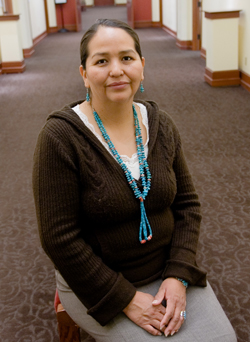Honoring Her Kinship
In New Mexico where Elvira Bitsoi Largie grew up and which she still calls home, the most important part of her life as a Navajo woman - and as a member of her Kinyaa'aanii clan - is "rising early and being in harmony with Mother Earth and Father Sky and the natural forces of the world: earth, wind, fire and water."
These days, at Teachers College in often-hectic
That Largie is here at all is a testimony to her remarkable determination, desire and hard work. She grew up in Tseyat-, a remote area of
"After high school, I thought the only thing I could do was to have a family," she said. She married her neighbor, had five children and continued to live with her mother, surrounded by relatives who were part of an extended family. Yet because it was her goal to be "the best mother in the world," Largie took teacher education courses at a branch college near her home and earned a pre-professional associate's degree.
That was when she began thinking about how to combine her hunger for education with her desire to live according to traditional beliefs. She began working as a teacher assistant, then as a teacher in a public school, then as administrator of a bilingual Navajo and Spanish program, and finally as a director of a multi-state (New Mexico, Arizona and Utah) technology program in the Four Corners region of the U.S. Somehow, through it all, she left home at 4:30 a.m. each Monday and returned at midnight after driving 200 miles to attend classes at the University of New Mexico, Albuquerque, where she eventually earned her M.A. in Education.
While attending her commencements, Largie was inspired with her next goal: to earn a doctorate - the one way she believed she could be influential in both her community and academia. Commuting 600 miles from her home to
Her postdoctoral fellowship at Teachers College is Largie's first experience leaving home for an extended period. (She waited for her children to be grown before pursuing such an opportunity.) While it hasn't been easy to be away from her community and family, Largie is driven by a need to do what she can to improve education back home. Recently, she heard a senior faculty member talk about TC's remarkable library and the experts here on equity, justice and non-discrimination: "It made me wonder, - 'How do I take these lofty ideas and add a pinch of economic opportunity and take it to my small community and to the greater Navajo Nation?'"
This semester, Largie is working on a research project that includes a cost utility analysis of higher education programs that serve Native American students. She will undertake a comparative study of schools that deliver alternative educational programs. In January, she plans to share her culture with TC students by teaching a course in educational leadership that incorporates Native American wisdom and knowledge.
"I would like to bring in Native American traditional speakers to talk about oral history and cultural knowledge and wisdom to teach leadership attributes from a Native American perspective," Largie says. She also hopes to show how concepts such as algebra are taught through Navajo rug weaving.
"In the world of academia it is competitive, while in my culture, everyone moves together," she said, reciting a creed that defines her cultural beliefs: "Wherever you go, don't forget who you are and where you are coming from. Go with a positive attitude and don't try to be who you are not or to be better than the other." As for Largie herself, no matter where she goes, she will always be a Navajo woman and part of her Kinyaa'aanii clan.
Published Wednesday, Dec. 13, 2006
